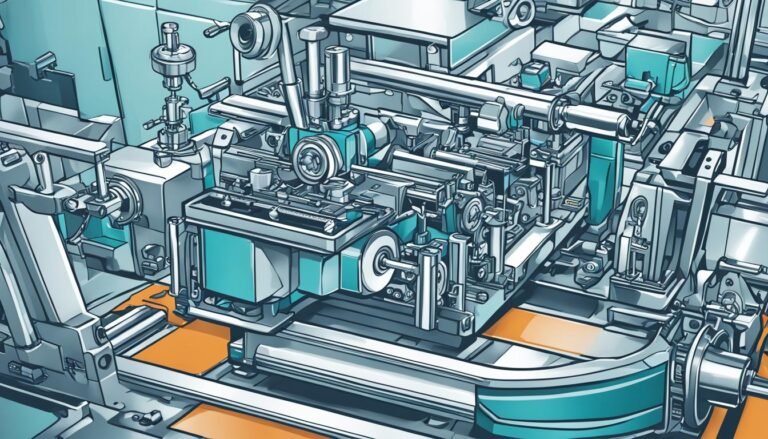Emotional Intelligence for Manufacturing Leaders
Did you know a 40-year study by UC Berkeley found emotional intelligence (EQ) is four times more important than IQ for success? This shows how big of an impact EQ has, especially in complex places like manufacturing. With challenges like finding skilled workers, fast operations, political issues, and new digital strategies, good leadership is key.
For leaders in manufacturing, emotional intelligence is essential. It helps them lead their teams well. Being able to bounce back emotionally, communicate well, and build strong relationships is crucial. Leaders with high emotional intelligence create a positive work culture. This leads to better results for everyone.
Modern manufacturing is complex, with teams working together and adapting to new market needs. Leaders with strong emotional intelligence guide and motivate their teams. Companies that focus on emotional intelligence in their leaders see better productivity, happier teams, and clear goals.
Key Takeaways
- Emotional intelligence (EQ) is four times more effective than IQ in predicting success, as per UC Berkeley’s long-term study.
- The role of emotional intelligence in manufacturing leaders is crucial for effective team management and productivity.
- Leaders with high emotional resilience enhance team collaboration and communication.
- Manufacturing leaders must navigate complex operational and political environments with strategic planning and innovation.
- Organizations that invest in emotional intelligence training for leaders see significant improvements in productivity and team morale.
Understanding Emotional Intelligence
Emotional intelligence (EI), also known as EQ, includes four key parts: self-awareness, self-management, social awareness, and relationship management. It’s a key skill for leaders in manufacturing. It greatly affects both personal and team success. In fact, 75% of employers look at EI when deciding on promotions and raises.
Self-Awareness
Self-awareness means knowing your own feelings and how they affect your actions and choices. Only 10 to 15 percent of people are truly self-aware, which can be a challenge in manufacturing. Leaders with high self-awareness can handle tough work situations better and help their teams stay emotionally strong.
Self-Management
Self-management is about controlling your emotions to stay motivated and focused, even when things get stressful. This skill helps manufacturing leaders stay calm and make clear decisions. Having high emotional intelligence means employees are 93% more productive, showing how important self-management is.
Social Awareness
Social awareness means understanding and responding to others’ emotions and needs. This is key in manufacturing, where teamwork is crucial. DDI says empathy is the top leadership skill. Leaders who are empathetic do more than 40 percent better in leadership roles, like coaching and making decisions.
Relationship Management
Relationship management is about using your own and others’ emotions to improve how you interact with people. In manufacturing, this can lead to solving conflicts and better teamwork. Research from TalentSmart shows that high EI is the best predictor of performance. Leaders with high EI also keep 70% more employees, creating a stable and committed team.
Improving emotional intelligence in manufacturing brings big benefits, like more productivity and better conflict resolution. By boosting self-awareness and emotional resilience, leaders can make their teams work better together.
Importance of Emotional Intelligence in Manufacturing
In the fast-paced world of manufacturing, emotional intelligence is key for success and productivity. A study by the World Economic Forum’s “Future of Jobs Survey 2020” found emotional intelligence will be crucial by 2025. This skill is vital in the manufacturing sector.
Adding emotional intelligence to hiring and training at all levels helps build a resilient workforce. This skill links to perseverance, self-control, and confidence. It helps leaders tackle complex challenges well.
Empathy in Leadership
Empathy is crucial for leaders in manufacturing. It helps them understand and support their team’s feelings, boosting teamwork and morale. Statistics show 35% of leaders credit emotional intelligence for their success. Also, 42% say it helps teams perform better.
Empathy lets leaders connect deeply with their teams. This builds trust and respect, key for motivating teams in manufacturing.
Managing Emotions at Work
It’s important to manage emotions at work for a positive and productive environment. Emotional intelligence gives workers skills to handle stress and make good decisions. In manufacturing, where things are fast-paced and high-pressure, these skills are a must.
Research shows emotional intelligence in leaders boosts team unity and performance by 27%. Also, 49% of leaders see it as key in making decisions. This proves its value in the industry.
For leaders and team members, managing emotions well can greatly improve job performance and the work environment. Training in emotional intelligence has shown a 32% job performance boost. This highlights the need for such training to build a strong workforce.
| Statistic | Percentage |
|---|---|
| Leaders attributing success to emotional intelligence | 35% |
| Leaders believing emotional intelligence positively impacts team performance | 42% |
| Increase in team cohesiveness and performance due to emotional intelligence | 27% |
| Leaders identifying emotional intelligence as crucial for decision-making | 49% |
| Increase in job performance due to emotional intelligence training | 32% |
Enhancing Teamwork with Emotional Intelligence
Emotional intelligence (EI) is key to better teamwork in manufacturing. Over the past two decades, the time spent working together has jumped by more than 50%, says Harvard Business Review. This shows how important effective communication skills, motivating manufacturing teams, and building trust with employees are.
Teams with higher EQ work better together, trust each other more, and solve conflicts better. Gitnux’s 2023 Emotional Intelligence Statistics show that 95% of HR managers and 99% of employees think EQ is a must-have skill. When team members are good at working with others, they talk better, listen well, and avoid mix-ups.
Motivating manufacturing teams gets easier when leaders know how to handle emotions. Studies say, emotionally smart leaders make places where people feel valued and respected. This leads to more engagement, happiness, and focus at work.
- Leaders with high emotional intelligence handle people well, making effective communication in the team easier.
- Group emotional intelligence is key for building trust, identity, and feeling capable.
- Setting EI standards in teams makes working together and cooperating better.
Good communication means tailoring how you talk to fit your team. This makes messages clear and respectful, avoiding mix-ups that could mess up the supply chain. In supply chain management, leaders should use emotional intelligence by:
- Knowing themselves better
- Listening well
- Understanding others
- Handling conflicts
- Giving feedback and praise
Teams that feel seen and valued by leaders with EI trust them more. This makes them more engaged, productive, and loyal. By solving conflicts with empathy and fairness, these leaders help create a place where everyone works well together.
Building trust with employees is very important. As EI grows in a team, the whole organization works better together, has a stronger work ethic, and runs more smoothly. This helps motivating manufacturing teams to reach their goals together.
Emotional Intelligence Training for Leaders
Emotional intelligence training is key for leaders in manufacturing. It helps them build a strong and productive team. The American Management Association (AMA) offers a top course, “Leading with Emotional Intelligence,” rated 4.9 out of 5.
Training Programs
The Emotional Intelligence for Manufacturing Leaders course gives deep insights into emotional skills. It’s a three-day course available in person and online, offering 1.8 CEUs and professional credits. It teaches leaders to connect, inspire, and act with resilience.
Leaders learn to use emotional intelligence to handle change and resistance better. The course covers developing emotional insights, managing behaviors, and improving communication.
Leadership Development Initiatives
Leadership development focuses on creating a climate of emotional intelligence. It trains leaders to use emotional data and adapt to different situations. The goal is to improve teamwork and creative communication.
Adding emotional intelligence to leadership boosts communication, trust, and performance. It helps solve complex problems, making the workplace healthier and more effective.
Building Trust with Employees
Emotional intelligence training helps build trust with employees. Leaders learn to create a positive emotional climate, improving trust and team unity. The American Management Association’s courses highlight trust-building as crucial.
Empathy and good communication are key to trust. Leaders who manage their and their team’s emotions build a respectful and cooperative environment. This leads to happier workers and better productivity, key for manufacturing success.
| Course | Duration (Hours) | Cost (USD) | Rating |
|---|---|---|---|
| Leading with Emotional Intelligence | 6 hours | Varies | 4.9/5 |
| Introduction to Emotional Intelligence | Approx. 6 hours | 99 | Varies |
Conclusion
Emotional intelligence is key for leaders in manufacturing. It helps them motivate and guide their teams for better performance. With different generations working together, like Baby Boomers, Generation X, Millennials, and Generation Z, it’s vital to understand each one’s view. This understanding boosts innovation and teamwork.
Studies show that workers with high emotional intelligence are more adaptable and build strong support networks. This is important because over 40% of the skills employers look for are soft skills. These include emotional intelligence, communication, and teamwork.
Emotional intelligence also helps leaders solve conflicts better, saving time and improving efficiency. Leaders with high emotional intelligence make their teams more resilient. This leads to happier workers and fewer people leaving their jobs. Emotional intelligence is becoming a must-have skill for leaders to stay ahead in the changing industry. By focusing on this skill, manufacturing companies can tackle today’s and tomorrow’s challenges better.
Source Links
- Great Manufacturing Leaders Do These 8 Things | Conner Industries
- Emotional Intelligence for Effective Leadership
- Council Post: The Importance Of Emotional Intelligence At Work
- Emotional Intelligence in Leadership: Why It’s Important
- THE EFFECTIVE LEADER: UNDERSTANDING AND APPLYING EMOTIONAL INTELLIGENCE – Ivey Business Journal
- The Importance of Emotional Intelligence in the Workplace
- Emotional intelligence, leadership, and work teams: A hybrid literature review
- 5 Steps to Building an Emotionally Intelligent Team – HSI
- Leading with Emotional Intelligence in Supply Chain Management: Building Stronger Connections with Teams – Perfect Planner
- Building the Emotional Intelligence of Groups
- Leading with Emotional Intelligence
- Emotional Intelligence Training for Leaders and Managers
- Navigating Generational Shifts in Manufacturing | Bryq
- The Importance of Emotional Intelligence (EQ) in Leadership







